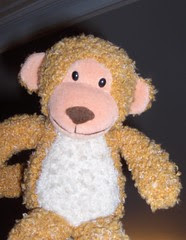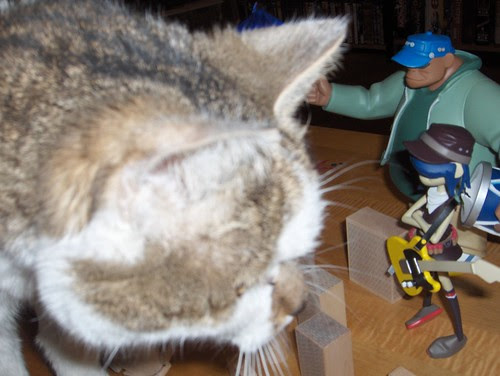R: Superman's Pal Jimmy Olsen #110 (April 1968), art by Neal Adams
(Click picture to beehive-size)

 Hi hi hi everyone! It's me, Bully! No, it really it is me: I'm in my gorilla suit! That's because it's the most wonderful day of the year: National Gorilla Suit Day! I certainly hope you are wearing your gorilla suit today too. I could hardly sleep last night: I laid out my suit before I went to bed and I kept getting up to look at it all through the night! (But you're not allowed to put it on until morning). And you do have to go to sleep! While you are sleeping, The Great Ape swings in through your window, helps himself to the coconuts you have left out, goes through your fridge and makes himself a banana daquiri, and then blesses your gorilla suit with a loving "ook ook" before he swings on down the street! So you can only imagine my thrills when I woke up and found banana peels on the kitchen floor and the blender had been used! Hooray! I climbed right into my suit—I only need a little help zipping it up the back—and set about having an fun-filled day of the most exciting National Gorilla Suit Day activities:
Hi hi hi everyone! It's me, Bully! No, it really it is me: I'm in my gorilla suit! That's because it's the most wonderful day of the year: National Gorilla Suit Day! I certainly hope you are wearing your gorilla suit today too. I could hardly sleep last night: I laid out my suit before I went to bed and I kept getting up to look at it all through the night! (But you're not allowed to put it on until morning). And you do have to go to sleep! While you are sleeping, The Great Ape swings in through your window, helps himself to the coconuts you have left out, goes through your fridge and makes himself a banana daquiri, and then blesses your gorilla suit with a loving "ook ook" before he swings on down the street! So you can only imagine my thrills when I woke up and found banana peels on the kitchen floor and the blender had been used! Hooray! I climbed right into my suit—I only need a little help zipping it up the back—and set about having an fun-filled day of the most exciting National Gorilla Suit Day activities:


















She sprang it on me before breakfast. There in seven words you have a complete character sketch of my Aunt Agatha. I could go on indefinitely about brutality and lack of consideration. I merely say that she routed me out of bed to listen to her painful story somewhere in the small hours. It can't have been half past eleven when Jeeves, my man, woke me out of the dreamless and broke the news:Yes, there it is, folks: the very first appearance in print of Jeeves, the ultimate gentleman's gentleman. (And this is our first look at Bertie, too.) I bet you're excited at the prospect of the earliest adventures of Jeeves, huh? Let's take a look at another one of Jeeves's immortal lines from that story:
'Mrs Gregson to see you, sir.'
Jeeves came in with the tea.Hah! Fantastic Jeeves quote, eh? And then there's...
'Jeeves,' I said, 'we start for America on Saturday.'
'Very good, sir,' he said; 'which suit will you wear?'
'Gussie, old top,' I said, 'leave me for a while. I would be alone. I think I've got brain fever or something.'The Man with Two Left Feet has a number of unusual stories. Two are narrated by a dog who, after a lowly birth, finds himself falling into fortune and companionship. The writing isn't up to Wodehouse's later skill, but there's good humor to be found in the dog's misunderstanding of the intentions of the humans around him, if not necessarily in the dog's name. Because he's a black dog, he's nicknamed the n-word...an unfortunately jarring moniker in this day and age but a relic of an older and different time—and I feel fairly certain that Wodehouse, judging from his writing and biographies, would have blanched if he'd realize the loaded bomb that word would become in later years. Skip over the name (it's only mentioned once) and they're actually quite funny and delightful stories about dog-makes-good:
'Sorry, old man; perhaps New York doesn't agree with you. When do you expect to go back to England?'
I looked again at Aunt Agatha's cable.
'With luck,' I said, 'in about ten years.'
When he was gone I took up the cable and read it again.
'What is happening?' it read. 'Shall I come over?'
I sucked a pencil for a while, and then I wrote the reply.
It was not an easy cable to word, but I managed it.
'No,' I wrote, 'stay where you are. Profession overcrowded.'
Round the corner, as the boss was speaking, I saw the kennel-man coming with a plate in his hand. It smelt fine, and he was headed straight for me.About halfway through the book the stories from the mid-to-late teens turn a bit more emotional and sentimental (without becoming maudlin or cloying). A girl is unable to marry her love because her guardian grandfather forbids it...and he thinks he's the King of England. It's a quietly touching eccentricity that's not played for giggles or laughs as later Wodehouses would be, and in lesser hands it would be a tearjerker. In fact, this story and many of the others in the collection remind me of the short stories of O. Henry: quiet and touching, with twist endings (either dramatic or soft) that resolve the tale on an ironic touch.
He put the plate down before me. It was liver, which I love.
'Yes,' went on the boss, 'if it hadn't been for him, Peter would have been kidnapped and scared half to death, and I should be poorer, I suppose, by whatever the scoundrels had chosen to hold me up for.'
I am an honest dog, and hate to obtain credit under false pretences, but-liver is liver. I let it go at that.
There still come days in the spring when the country seems to get a stranglehold on me and start in pulling. This particular day had been one of them. I got up in the morning and looked out of the window, and the breeze just wrapped me round and began whispering about pigs an chickens. And when I went out on Fifth Avenue there seemed to be flowers everywhere. I headed for the Park, and there was the grass all green, and the trees coming out, and a sort of something in the air—why, say, if there hadn't have been a big policeman keeping an eye on me, I'd have flung myself down and bitten chunks out of the turf.Picture the entire story read aloud by Arleen Sorkin (in her "Harley Quinn" voice) and I think you've got Wodehouse's intent: a tough-as-nail New York gal with a soft heart and a desire to see right done for a country wife sadly ignored by her nightclubbing husband. Add an O. Henry twist with a callback to a much-discussed character earlier in the story and it's as neat and tight a little tale as those of Mister William Sydney Porter's.
